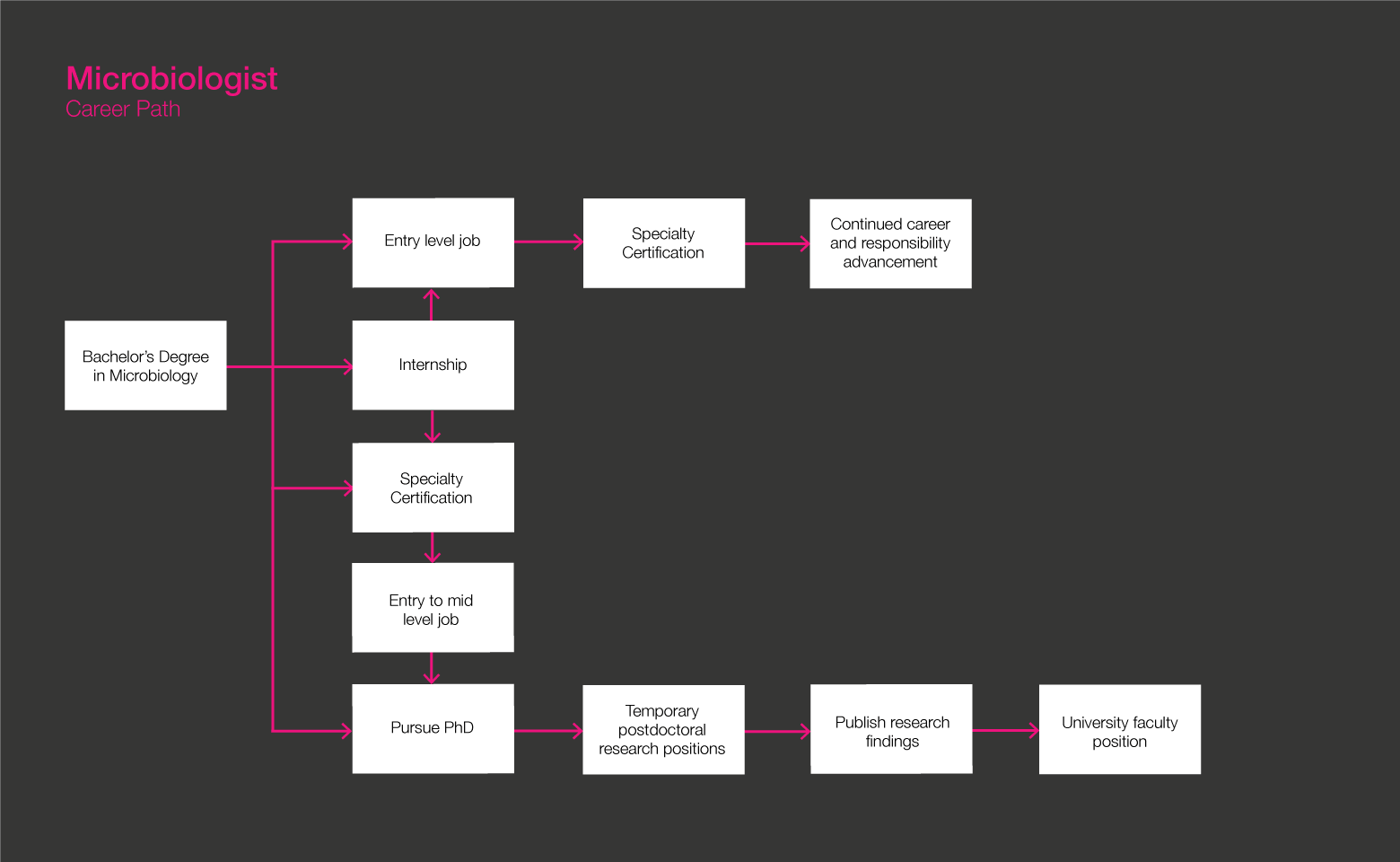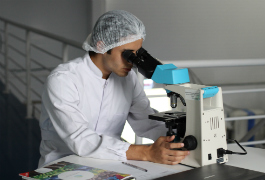Spotlights
Bacteriologist, Clinical Laboratory Scientist, Clinical Microbiologist, Microbiological Analyst, Quality Control Microbiologist (QC Microbiologist)
Clinical microbiologists analyze blood, tissue and other samples to find the disease-causing organisms present in people, animals and foods. These professionals may also help physicians diagnose and control the spread of infections.
- Mức lương tốt
- Choice of multiple disciplines to specialize in, such as immunology and bacteriology
- Able to work in a variety of industries, including research, education or food
- Assisting physicians in diagnosing illnesses and selecting treatments
- Conducting research and experiments, the level of which depending on the professional’s education and certification background
- Using highly technical equipment and technology to study and take cultures from a variety of organisms, such as fungi, viruses and bacteria
- Being responsible for producing viral vaccines and other substances for medical analyses
- Testing food samples for potential poisoning agents
- Performing administrative duties, such as coordinating and supervising projects, presenting research findings and preparing technical reports
- Laboratory - either in a hospital or a specialized lab that communicates / interacts with doctors offsite
- Office (for administrative duties)
- Industrial settings
- University or school when taking teaching route
- Participating in rotating night and weekend shifts
- Risking exposure to diseases, illnesses, noxious fumes, high-pressure laboratory systems and radiation
- Depending on your career goals, you may be in school for ten years (total years for undergraduate and doctoral studies)
- Graduate school costs and repayments may initially offset benefit of salary (tuition and fees could exceed $20,000 for each year in a graduate program)
-
Increasingly common for microbiologists to work on teams with technicians and scientists in other fields, because many scientific research projects involve multiple disciplines
- Conducting experiments with science kits
- Watching shows and movies and reading books related to science / laboratories
- Playing outside and exploring nature
- Microbiologists usually complete a bachelor’s microbiology, biology, or natural resources
- Common courses include math, physics, organic chemistry, microbial genetics, pathogenic microbiology, cellular physiology, environmental microbiology, virology, biochemistry, statistics, and computer science, among others
- Per O*Net Online, 48% of workers in this field have a bachelor’s, 17% have a post-bacc certificate, and 13% have a master’s degree
- Lab experience is needed and can be gained both through college programs and internships
- To work in independent research, in a specialized subfield, or for a college, students may need a PhD
- Certifications may be needed to work in clinical microbiology, food safety, pharmaceuticals, and medical device areas
- The American Society for Clinical Pathology offers certification exams for Technologist in Microbiology (M) and Specialist in Microbiology (SM). The SM exam requires prior completion of Medical Lab Scientist certification
- One common cert program — the American College of Microbiology’s NCRM certification exam — was recently discontinued for new registrants
- Plan ahead for the rigors of college by studying foundational topics in high school, like biology, math, and chemistry
- Consider whether you want to go for a master’s degree or a post-bacc certificate such as the American Society for Clinical Pathology’s Technologist in Microbiology
- Gain lab experience through paid internships
- Decide which of the common branches of the field you’ll want to specialize in, such as bacteriology, immunology, mycology, nematology, parasitology, phycology, protozoology, or virology
- Think about which subfield/applied research field you might be interested in, such as clinical microbiology, medical, agricultural, food safety, or pharmaceuticals
- Those interested in research jobs should select from astromicrobiology, evolutionary microbiology, cellular microbiology, microbial ecology, microbial genetics, microbial physiology, and systems microbiology
- Tham gia các tổ chức chuyên nghiệp để tìm hiểu, phát triển và kết nối mạng (xem Tài nguyên > trang web được đề xuất của chúng tôi để biết danh sách các tùy chọn)

- Roughly 31% of Microbiologists work in R&D positions; 13% work in pharmaceutical/medicine manufacturing jobs; 11% work for government agencies; 11% work at colleges; and 6% work for state agencies
- BLS projects increased job opportunities in certain areas such as pharmaceutical and biotech, as well as food production/agriculture and roles at chemical plants
- Ensure you have the appropriate mix of academic credentials, laboratory experience, applicable certifications, and relevant work experience for the jobs you apply to
- Microbiology internships are a solid first step for many people entering the field
- Check out popular job portals such as Indeed, Simply Hired, Glassdoor, and Zippia for openings
- Use job portals to see which companies are most popular or are hiring the most
- For example, Indeed lists these employers are Top-rated companies for Microbiologists: Mako Medical Laboratories, Boeing, Bayer, Roche, and Teva Pharmaceuticals
- Zippia lists these employers as having the most current openings: Pfizer, Bristol-Myers Squibb, Novartis, Advanced Testing Laboratory, Eurofins Scientific
- Stay active with professional organizations. Attend conferences, make connections, and let your network know when you’re looking for a new job
- Review Microbiology resume templates to get ideas for wording and formats
- Study Microbiologist interview questions to prepare for job interviews!
- Communication skills: should be able to effectively communicate their research processes and findings so that knowledge may be applied correctly
- Detail oriented: must be able to conduct scientific experiments and analyses with accuracy and precision
- Interpersonal skills: typically work on research teams and thus must work well with others toward a common goal; many also lead research teams and must be able to motivate and direct other team members
- Logical-thinking skills: must be able to draw conclusions from experimental results through sound reasoning and judgment
- Math skills: these professionals regularly use complex mathematical equations and formulas in their work, so they need a broad understanding of math, including calculus and statistics
- Observation skills: responsible for constantly monitoring their experiments; they need to keep a complete, accurate record of their work, noting conditions, procedures, and results
- Perseverance: their involves substantial trial and error, and microbiologists must not become discouraged in their work
- Problem-solving skills: these professionals use scientific experiments and analysis to find solutions to complex scientific problems
- Time-management skills: need to be able to meet deadlines when conducting research and laboratory tests; they must be able to manage time and prioritize tasks efficiently while maintaining their quality of work
- Internship supervisors
- Guidance counselors
- Teachers or professors
- Alumni in same program (reach out through social media, such as LinkedIn, or ask guidance counselor / professor for suggestions and introductions)
Các trang web
- American Academy of Oral and Maxillofacial Pathology
- Hiệp hội vì sự tiến bộ khoa học Hoa Kỳ
- American Dental Education Association
- Viện Khoa học Sinh học Hoa Kỳ
- Hiệp hội Sinh học Tế bào Hoa Kỳ
- Hiệp hội Bệnh học Lâm sàng Hoa Kỳ
- Hiệp hội Vi sinh vật học Hoa Kỳ
- American Society for Virology
- Hiệp hội Công trình Nước Hoa Kỳ
- AOAC International
- Liên đoàn các Hiệp hội Sinh học Thực nghiệm Hoa Kỳ
- International Union of Microbiological Societies
- Microbiological Garden
- Society for Industrial Microbiology and Biotechnology
- The American Society for Cell Biology
- Tree of Life Web Project
Sách vở
- Biological Technician: for those who want to work in the sciences, but don't want their opportunities limited by not having a graduate degree; they assist scientists in the lab, and a bachelor's degree in biology or a related field is typically the only educational requirement
- Epidemiologist: for those who are particularly interested in studying infectious diseases and finding ways to prevent and cure them and would like better career prospects; a master's degree in the field is the minimum requirement, although those who work in universities usually have Ph.D. degrees
Microbiologists typically receive greater responsibility and independence in their work as they gain experience. This can be achieved through certification and higher education. Ph.D. microbiologists usually lead research teams and control the direction and content of projects.
https://www.bls.gov/ooh/life-physical-and-social-science/microbiologists.htm#tab-4
Be persistent, responsible and cooperative when working toward your goals and don’t be afraid to fail and make mistakes for the greater good.
Nguồn cấp tin tức

Công việc nổi bật

Các khóa học và công cụ trực tuyến

Kỳ vọng về mức lương hàng năm
New workers start around $99K. Median pay is $128K per year. Highly experienced workers can earn around $161K.
Kỳ vọng về mức lương hàng năm
New workers start around $86K. Median pay is $118K per year. Highly experienced workers can earn around $175K.






